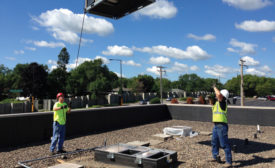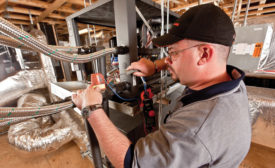Standards and Legislation
Contractors discuss the regulatory and economic conditions of the cities they represent
Read More
Coalition Amplifies the Mechanical Industry’s Voice in Washington
HPBCCC provides the HVAC industry a collective forum before Congress
Read More
SMACNA Honors Couple with Award
Award recognizes the Daniels' decades of dedicated legislative and political activism
November 16, 2015
DOE Releases Regional Standards Enforcement Proposed Rule
Industry will have 45 days from date of publication to comment on enforcement NOPR
Read More
Preventing the Next Outbreak of Legionnaires’ Disease
All building water systems — not just cooling towers — must be maintained
Read More
HVAC Industry Invests in Low-GWP Refrigerants
HVACR industry spent more than $255 million in 2015 to research, develop low-GWP refrigerants
Read More
ACCA’s Commercial Refrigeration Systems Maintenance Standard Recognized by ANSI
First standard for assessment and maintenance of commercial refrigeration equipment
November 2, 2015
OSHA Postpones Rule Enforcement
Enforcement of Confined Spaces in Construction Standard to begin in January
November 2, 2015
ACCA’s Residential Load Calculation Standard out for ANSI Public Review
Review period has a comment deadline of Nov. 30, 2015
October 29, 2015
Geothermal Industry Confident in Federal Tax Credit Renewal
Manufacturers and industry leaders are optimistic about extension or renewal after 2016
Read More
Copyright ©2024. All Rights Reserved BNP Media.
Design, CMS, Hosting & Web Development :: ePublishing









